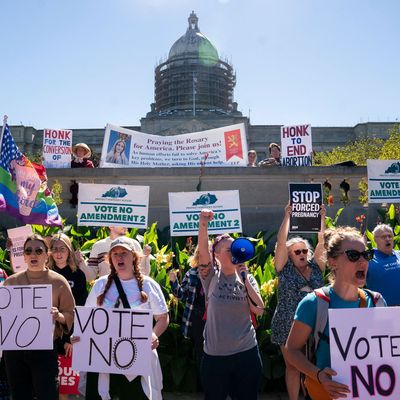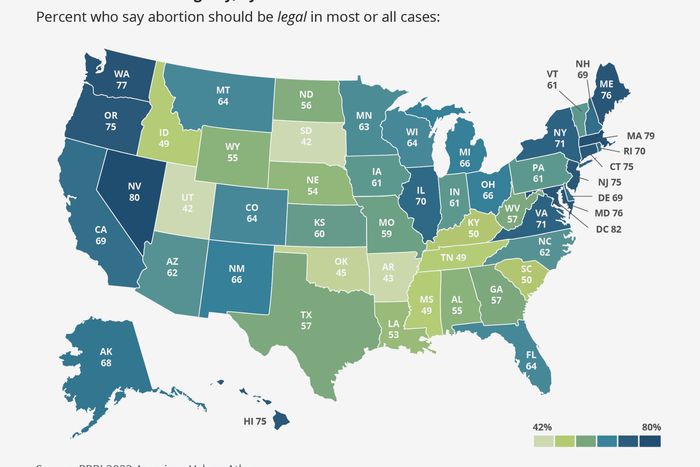
Since the Supreme Court’s reversal of Roe v. Wade empowered state governments to ban abortion, predictions about the future of U.S. abortion policy have focused on which party holds power in state governments. But public opinion in red states is not always aligned with the majority party’s positions, as shown by voters in deep-red Kansas, Kentucky, and Montana rejecting anti-abortion ballot measures last year. It’s been clear all along that there is a formidable pro-choice majority nationally, but how this majority is distributed matters a great deal under the Dobbs regime. Fortunately, the Public Religion Research Institute has now published a 50-state survey on abortion attitudes. And it should make a lot of Republican politicians and anti-abortion activists fearful.
PPRI found that there are pro-choice majorities in all but seven states:
Majorities of residents in 43 states and the District of Columbia say that abortion should be legal in most or all cases, and in 13 of those states and in DC, more than seven in ten residents support legal abortion. There are only seven states in which less than half of residents say abortion should be legal in most or all cases: South Dakota (42%), Utah (42%), Arkansas (43%), Oklahoma (45%), Idaho (49%), Mississippi (49%), and Tennessee (49%).
The map shows some particularly large pockets of pro-choice opinion in electoral-battleground states.
Even if this data is only roughly accurate, it raises some important questions. Do Nevada Republicans really want to stake their future on imposing abortion policies opposed by 80 percent of their citizens? And do they want to defy 60 percent–plus support for legal abortion in Arizona, Florida, Michigan, North Carolina, Pennsylvania, and Wisconsin? The trend lines are pretty clear as well: “Residents of nearly all states have become more likely to say abortion should be legal in most or all cases since PRRI’s last state-level data analysis, in 2018.”
Perhaps even more significantly, the percentage of those on either side of the abortion debate who treat the issue as a litmus test for voting has changed dramatically since Dobbs. In 2020, only 15 percent of pro-choice voters told PRRI “they will only vote for candidates who share their view on abortion”; now that number is 26 percent. Meanwhile, the percentage of anti-abortion voters treating this as a litmus test has declined slightly from 29 percent to 25 percent. Abortion is no longer an issue salient mostly for those most likely to vote Republican.
There are some signs of hope in this data for would-be Republican anti-abortion lawmakers. PRRI finds that somewhat larger minorities of Americans support selected abortion restrictions that fall short of total bans (though not majorities in any of the restrictions tested), such as prohibitions on abortions after 15 weeks of pregnancy. But, by the same token, there is overwhelming public opposition to some draconian measures the anti-abortion movement is insisting upon, such as bans on interstate travel to secure abortions (77 percent opposition) or the refusal to allow rape/incest exceptions to bans (72 percent opposition).
One potentially significant finding for Republicans who want to shake the iron grip of anti-abortion activists on their party is that the proportion of their own partisans who say they want to make all abortions illegal has dropped from 21 percent in 2021 to 14 percent in 2022. There is a sizable pro-choice minority among Republicans, as we saw in some of the 2022 ballot measure votes. PRRI finds that 37 percent of Republicans want abortion to be legal in all or most cases. In contrast, the anti-abortion faction of Democrats has all but disappeared; 86 percent of Democrats want all or most abortions to be legal, up from 71 percent as recently as 2010.
All in all, the notion that this is an equally divided nation on abortion policy, or that Republican state-level strength will make anti-abortion policies prevail everywhere other than in “coastal elite” pockets, doesn’t reflect the realities on the ground. The long-standing debate over gun violence does show that the GOP is willing and able to buck public opinion on issues near and dear to the hearts of those in their conservative base. But it’s no longer clear that Republican politicians or most Republican voters want to stake everything on remaining the party of forced birth.
More on life after roe
- ERA Ratification Is Now Up to Trump’s Supreme Court
- The Unlikely Reason RFK Jr. Could Be Rejected by the Senate
- Project 2025’s Mastermind Is Obsessed With Contraception































